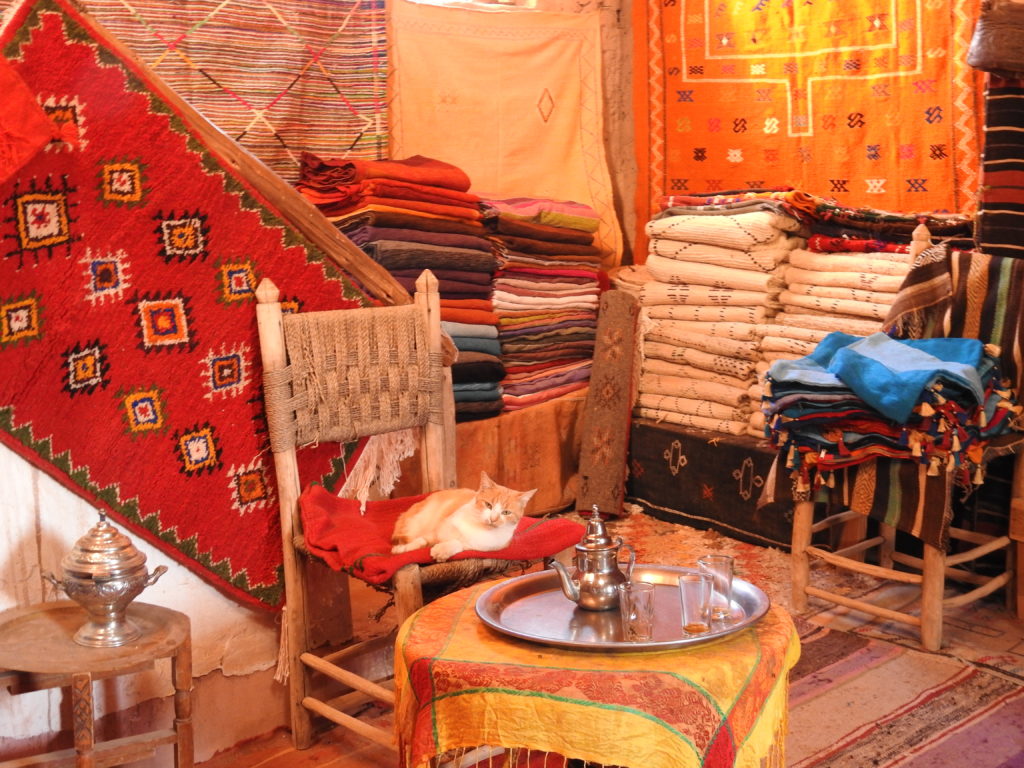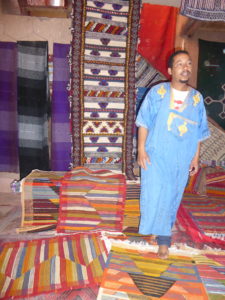
Meet the locals
On a Vistas Sketching Holiday, in addition to limitless incredible landscapes you are guaranteed authentic local flavour through the places we stay, the food we eat and the people we bump into or visit. In many cases these experiences become an established part of the itinerary as our new and old friends joyfully welcome us again and again.
One such character is Said, who, in partnership with a local women’s co-operative, runs a carpet shop deep inside the beautiful old kasbah at Ait Benhaddou, up and over the Atlas mountains, Morocco.
Lots of visitors to Morocco are drawn to the gorgeous hand-woven carpets and rugs and many end up buying one to take home, yet the choosing and the purchasing can sometimes be daunting. The wide array on offer can be overwhelming, the competition fierce and the sales techniques occasionally a little over-enthusiastic. For this reason, some shy away from the idea altogether and arrive home having resisted temptation, only to wish they had been braver!
Beneath a crumbling adobe archway, up steep cobbled steps and tucked away from the bustling crowds, Said’s shop is an oasis of calm, an ideal rest stop during a busy day’s sightseeing and sketching. Pile upon pile of colourful rugs, carpets and kilims line the room while the small windows with their traditional ornate ironwork direct dusty rays of sunlight onto the tufted, embroidered, stitched and woven creations strewn about the floor.
Said, handsome and charming in his blue desert robes, makes excellent mint tea and allows visitors to browse unhurried and with no obligation.
Originally from the small town of Tinghir at the edge of the desert regions, Said has always had an interest in arts and crafts. Like many young men in Morocco he also harboured a desire to work in tourism and, along with a friend, forged the idea of a shop inside the kasbah which could help local Berber women showcase their skills. Starting with just a small exhibition in the year 2000, the project grew and he now lives and works inside the kasbah along with his mother and a couple of other family members. When asked what he most enjoys about his job he says ‘meeting people from all around the world, and helping the Berber women who don’t speak any other language; explaining things for them’. In his spare time, he says, he likes to ‘help with cleaning the wool’. Life is simple in the kasbah: there is no mains electricity; they cook on a wood-fired stove. In the summer they sleep on the roof.
Said is knowledgeable about the textiles and their production, and he tells me:
‘The skill of Moroccan carpetmaking has been passed down through generations throughout history; it is one of the oldest crafts practised by Amazigh (Berber) women and was honed during the Phoenician civilization, which enabled them to acquire new skills such as wool-dyeing techniques, increasing the luster and aesthetics of the carpet.’ Traditional, hand-made carpets are still popular in Morocco, with most cities having a special ‘quarter’ in the souk dedicated to their production and sale. However many modern Moroccans have turned to cheaper, manufactured ‘immitations’ to use within their own homes, unless they are able to make their own. As Said explains, ‘the natural traditional product is more expensive than its manufactured counterpart, due to the fact that the traditional industry takes more time and effort compared to modern technologies’. Man can not compete with machine, yet a machine will never have that personal touch.

We pass many carpet shops on Vistas Moroccan sketching journeys and there are lots of opportunities to stop and admire or buy all kinds of artesania. On itineraries which include Ait Benhaddou, however (‘Discover Morocco’, ‘Far Horizons’) I like to introduce people to Said’s place: It’s a calm and attractive environment; he has a terrific selection; he does not practise the hard-sell; all purchases help local Berber women who otherwise might have no way of supporting themselves, and he will wrap and post your purchase if you don’t want to carry it with you.
Most importantly, he has a cat. I enjoy spending time with the cat.
Small businesses in all parts of the world have struggled with the sudden drying up of tourism during the Covid crisis and Said’s shop is no exception, with just a small trickle of intrepid travellers starting to filter through now. With luck, this business can weather the storm, provided there is hope on the horizon. I asked Said what he dreams of for the future. He confessed: ‘To see my friends from everywhere come back again and for everything to be as before’.
We all hope for that, Said. May 2021 be kinder to all of us and allow us to drink tea with you once again.
